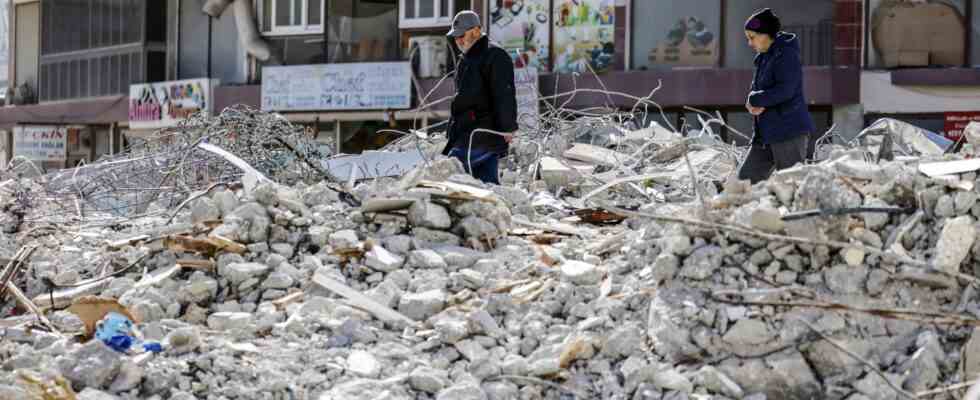As of: 02/17/2023 7:06 p.m
Thousands of aftershocks shook the earthquake areas in Turkey and Syria in the past eleven days – and it doesn’t stop. Drinking water is scarce, epidemics are threatening. But apparently people are still being saved.
While people in the Turkish-Syrian earthquake zone are struggling to survive, strong aftershocks continue to shake the region. For the coming days, the Turkish civil protection agency AFAD expects earthquakes with a magnitude of more than 5. There is an aftershock in the region about every four minutes, AFAD managing director for risk reduction, Orhan Tatar, told the state news agency Anadolu. So far there have been more than 4700 aftershocks.
According to the Ministry of Environment and Urban Planning, more than 84,000 buildings in Turkey have collapsed or been badly damaged. Thousands of houses have also been destroyed in Syria. In the earthquake areas, authorities are therefore still warning people not to return to their homes.
The number of confirmed deaths in Turkey and Syria is still rising. Most recently it was almost 44,000. Tens of thousands of people were also injured, and thousands are still missing. Millions of people are affected by the effects of the violent earthquakes.
Access to drinking water urgently needed
In Turkey there is already no drinking water in some places because of the destruction, as the head of the Medical Association (TTB) in Adana in southern Turkey, Selahattin Mentes, said. The district of Nurdag in Gaziantep is affected. Elsewhere, the tap water could possibly be contaminated by mixing with water from the sewage system. “We urgently need access to clean drinking water in the region and we have to establish hygiene. In addition, the garbage has to be disposed of.” Otherwise there is a risk of infectious diseases such as cholera.
Still rescues
Eleven days after the quake, however, there are also sensational reports of rescues. The state-affiliated broadcaster CNN Türk reported that helpers in the Turkish city of Antakya had rescued two people who had been buried from the rubble after 261 hours. According to the Turkish Health Minister Fahrettin Koca, one of the two young men insisted on calling a relative immediately after his release. A video showed how a person called burst into tears on the phone when he heard about the rescued.
According to the Anadolu state agency, a man was rescued in Hatay after 278 hours. However, the information could not be independently verified.
Disability of Media Workers in Turkey
The organization “Reporters Without Borders” accuses the Turkish authorities of obstructing reporting after the earthquake disaster. Violations of press freedom include physical violence, arrests, lawsuits, online persecution and restrictions on Twitter.
Media workers have been accused of defaming the police or the state. The journalist organization criticized that it was becoming increasingly clear that the government was trying to control reporting on the disaster and the reactions of the authorities. The managing director of “Reporters Without Borders” in Berlin, Christian Mihr, said: “The Turkish authorities must not use the tragedy to further restrict press freedom.” Reporters who are currently leading into the devastated areas were just doing their jobs in terrible conditions. Their reporting is more important than ever.
Airlift from Germany started
Meanwhile, international aid efforts for Turkey and Syria continue. A new air bridge was set up from Germany to the Turkish earthquake areas. Two Lufthansa Cargo planes took off from Frankfurt with relief supplies to Antalya. From Monday, the German-Turkish company SunExpress will be flying to Antalya on Mondays and Tuesdays with a passenger plane that has been converted purely for freight transport.
Jens Laerke, spokesman for the UN Office for the Coordination of Humanitarian Aid, said in Geneva that 143 United Nations trucks had been delivering aid from Turkey to north-west Syria since the middle of last week. After the earthquake, the population in the region was even more dependent than before on the supplies. The roads to and from the three open border crossings are passable. Deliveries of food, water, medicine and other humanitarian supplies will continue as long as people need them, Laerke said. Even before the earthquake, 4.1 million people in the region were dependent on humanitarian aid.
Meanwhile, Syria’s President Bashar al-Assad announced in a cynical television speech that the consequences of the war in the country had prepared the population for the earthquake. “The war, which drained resources and weakened capabilities, gave Syrian society the experience to deal with the earthquake.”

